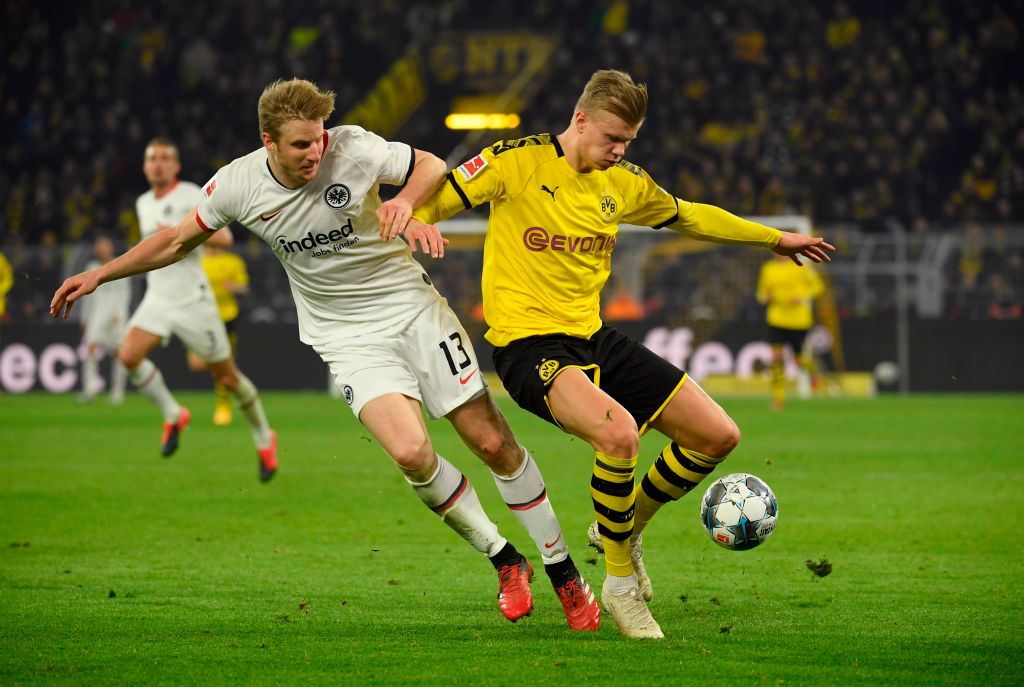How German soccer is navigating the tricky questions facing sports leagues

A free daily email with the biggest news stories of the day – and the best features from TheWeek.com
You are now subscribed
Your newsletter sign-up was successful
The eyes of the sports world will be focused on Germany this weekend.
The country's top professional soccer league, the Bundesliga, will become the first major European sport to resume play this Saturday, albeit without stands full of singing spectators. The reopening is bound to be a test case for leagues around the world that have been shut down by the coronavirus pandemic.
Teams will travel between away matches by bus and no more than 322 people — including players, coaches, referees, and other support workers — will be allowed inside stadiums. Detailed guidelines will limit contact before, during, and after matches. Coaches will wear masks on the sidelines and even balls will be disinfected during matches. Police will also make sure fans don't congregate outside, and the league says the home team will forfeit the match if they do.
The Week
Escape your echo chamber. Get the facts behind the news, plus analysis from multiple perspectives.

Sign up for The Week's Free Newsletters
From our morning news briefing to a weekly Good News Newsletter, get the best of The Week delivered directly to your inbox.
From our morning news briefing to a weekly Good News Newsletter, get the best of The Week delivered directly to your inbox.
Players have been training under strict social distancing guidelines for a few weeks, but that hasn't completely shut out the disease. The league tested nearly 2,000 individuals prior to government approval, turning up 10 positive results. The entire Dynamo Dresden team was quarantined and will be temporarily excluded from competition after two players tested positive.
An earlier incident also showed how tedious the situation can be. Hertha Berlin's Salomon Kalou was suspended after he posted a video to Facebook showing him shaking hands with teammates and interrupting the medical test of another.
Economic considerations were a massive factor in the decision to resume play. The Bundesliga's CEO, Christian Seifert, told The New York Times in April that canceling the season outright would cost almost $1 billion and put at least one out of every three clubs in financial crisis. Another problem is that a team's finishing place determines which competitions it qualifies for in the following season, with huge financial stakes. Abandoning an unfinished season would pose thorny questions about how to award spots for the next year. The Dutch Eredivisie, which canceled the remainder of its season and effectively nullified the results, is already facing a legal challenge from lower division teams which were in position to gain promotion before cancellation.
Some fans, meanwhile, are opposed to the idea of playing "ghost games" behind closed doors, which in their view proves that television money is prized over community involvement. League officials have been careful to acknowledge that many see it as inappropriate for sports to be given special exceptions while other aspects of social and economic activity remain limited. "It's a great responsibility for the clubs to implement the medical and organizational guidelines in a disciplined manner," Seifert told reporters. "Every matchday is a chance to prove that we deserve the next matchday."
A free daily email with the biggest news stories of the day – and the best features from TheWeek.com
The league will conduct more than 20,000 tests to monitor players and staff by the end of the season, hoped to be completed before the end of June.
Bryan Maygers was a deputy editor for TheWeek.com.
-
 The Olympic timekeepers keeping the Games on track
The Olympic timekeepers keeping the Games on trackUnder the Radar Swiss watchmaking giant Omega has been at the finish line of every Olympic Games for nearly 100 years
-
 Will increasing tensions with Iran boil over into war?
Will increasing tensions with Iran boil over into war?Today’s Big Question President Donald Trump has recently been threatening the country
-
 Corruption: The spy sheikh and the president
Corruption: The spy sheikh and the presidentFeature Trump is at the center of another scandal
-
 ‘One Battle After Another’ wins Critics Choice honors
‘One Battle After Another’ wins Critics Choice honorsSpeed Read Paul Thomas Anderson’s latest film, which stars Leonardo DiCaprio, won best picture at the 31st Critics Choice Awards
-
 Son arrested over killing of Rob and Michele Reiner
Son arrested over killing of Rob and Michele ReinerSpeed Read Nick, the 32-year-old son of Hollywood director Rob Reiner, has been booked for the murder of his parents
-
 Rob Reiner, wife dead in ‘apparent homicide’
Rob Reiner, wife dead in ‘apparent homicide’speed read The Reiners, found in their Los Angeles home, ‘had injuries consistent with being stabbed’
-
 Hungary’s Krasznahorkai wins Nobel for literature
Hungary’s Krasznahorkai wins Nobel for literatureSpeed Read László Krasznahorkai is the author of acclaimed novels like ‘The Melancholy of Resistance’ and ‘Satantango’
-
 Primatologist Jane Goodall dies at 91
Primatologist Jane Goodall dies at 91Speed Read She rose to fame following her groundbreaking field research with chimpanzees
-
 Florida erases rainbow crosswalk at Pulse nightclub
Florida erases rainbow crosswalk at Pulse nightclubSpeed Read The colorful crosswalk was outside the former LGBTQ nightclub where 49 people were killed in a 2016 shooting
-
 Trump says Smithsonian too focused on slavery's ills
Trump says Smithsonian too focused on slavery's illsSpeed Read The president would prefer the museum to highlight 'success,' 'brightness' and 'the future'
-
 Trump to host Kennedy Honors for Kiss, Stallone
Trump to host Kennedy Honors for Kiss, StalloneSpeed Read Actor Sylvester Stallone and the glam-rock band Kiss were among those named as this year's inductees